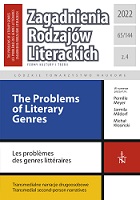Przekraczając horyzont inności: narracja drugoosobowa w fabularnych grach cyfrowych jako problem biopolityczny
Crossing the Horizon of Otherness: Second Person Narration in Story Driven Digital Games as a Biopolitical Problem
Author(s): Michał KłosińskiSubject(s): Media studies, Political Philosophy, Philosophy of Science, Social Informatics, ICT Information and Communications Technologies
Published by: Łódzkie Towarzystwo Naukowe
Keywords: second person narrative; You turn; digital games; narratology; game studies;
Summary/Abstract: This article focuses on an analysis of the function of the second-person narrative in digital fictional games. It combines two research fields: game narratology and biopolitical philosophy. The article begins with a brief discussion of the assumed understanding of the second-person narrative and the second person address in the latest research by Astrid Ensslin and Alice Bell. Then, through selected examples of games, situations of using a second-person narrative are presented in two formulas: in the case of Disco Elysium crossing the horizon of otherness is explored, and in the case of The Stanley Parable and Control a hostile takeover is discussed. The theoretical framework for the discussed issues is a biopolitical reflection on the construction of a modern subject through the thought of Michel Foucault and the relationship of the individual to the community in the philosophy of Roberto Esposito. In the text, the latest research on the cooperative, enactive nature of the second-person narrative is referred to, and the game studies research on the biopolitics of avatars. Therefore, the narrative theory is combined with the issues of contemporary reflection on the limits of subjectivity in digital games. The thesis being put forward here is that the second-person narrative in the perspective of crossing the horizon of otherness makes it possible to negate the neoliberal patterns of subjectivity constructed in games, because it requires empathy, cooperation with another subject, recognition of the boundaries set by another. On the other hand, the perspective of hostile takeover reveals situations of abusing the subjectivity of another or a player, which results from the creation of a narrative situation indicating a lack of respect for personal boundaries. Therefore, the second-person narrative is interpreted here in digital games as one of the problems of contemporary reflection on the biopolitical dimension of subjectivity in games.
Journal: Zagadnienia Rodzajów Literackich
- Issue Year: 65/2022
- Issue No: 4
- Page Range: 83-95
- Page Count: 13
- Language: Polish

